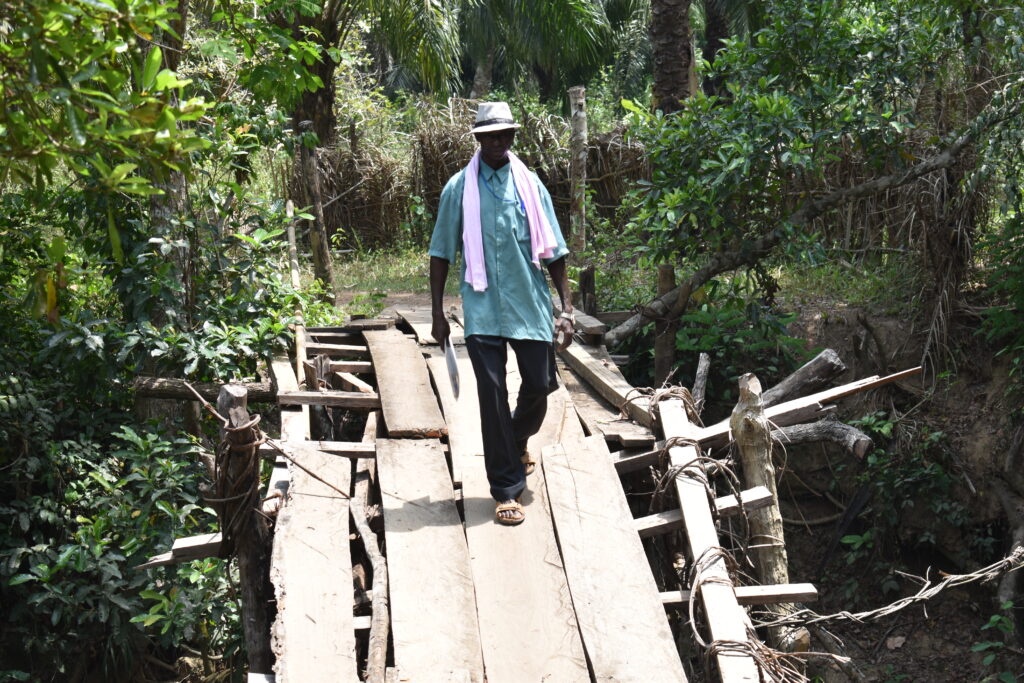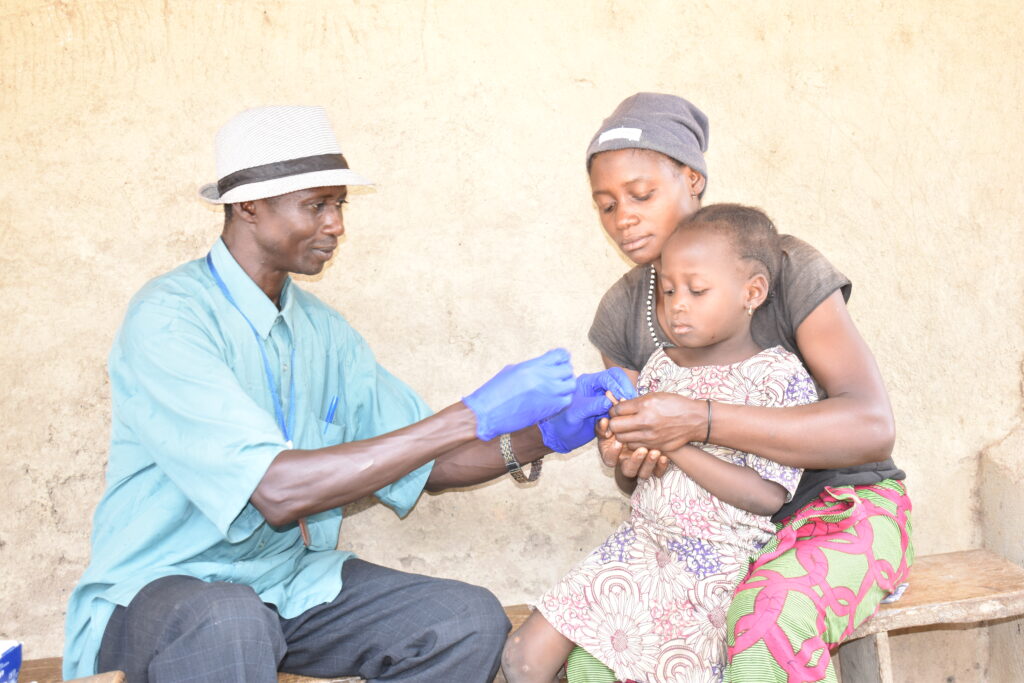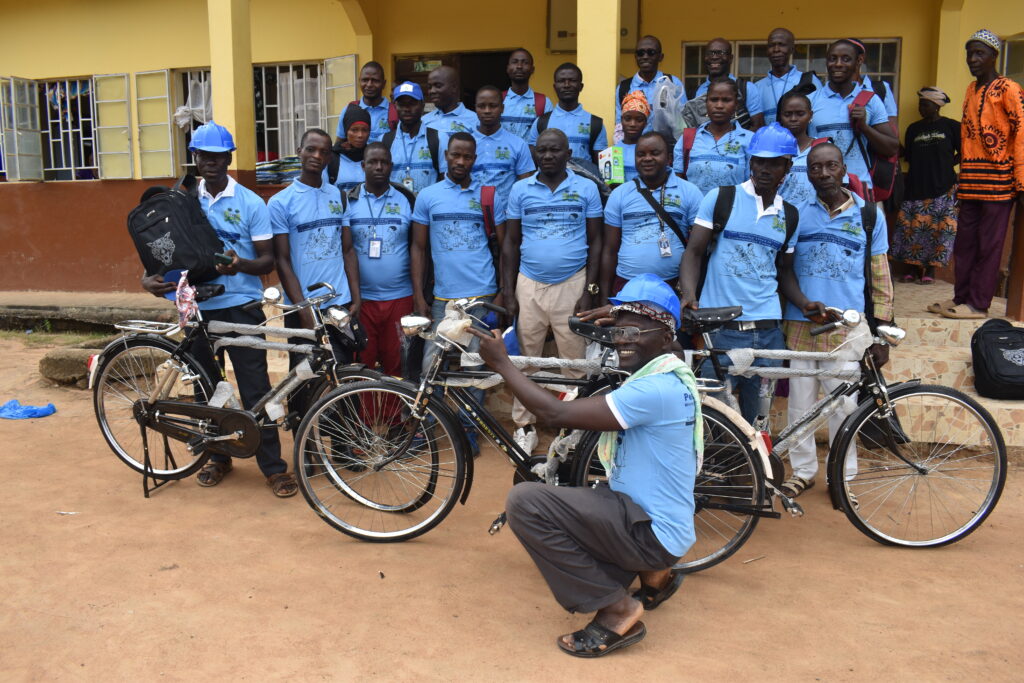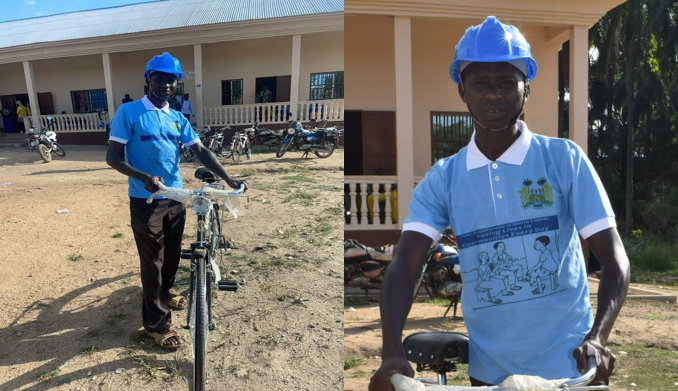“The terrain is rough here and some people live in difficult places, but I have to reach them, so I walk. Providing door-to-door care is very challenging, but I’m determined to support my community.” says Dinkie Kalie Marah.
Walking long distances on rugged, remote roads is part of Dinkie’s daily routine. Since 2012, Dinkie has been a community health worker (CHW) and peer supervisor for Dolla Village in the Falaba District in northern Sierra Leone. Falaba District, which has a total population of 18,000, includes several remote communities that have little or no access to healthcare facilities.
The main route to these communities is through a swinging bridge (pictured below), which makes reliable access to essential health services difficult and makes referrals for critical care to secondary health facilities very challenging.

Community health worker, Dinkie Kalie Marah, walking across a swinging bridge that serves as the main access route to hard-to-reach communities in Falaba District, Sierra Leone. Photo credit: PMI Impact Malaria in Sierra Leone
“Every blessed day, I wake up as early as 6:00 AM to make sure that I’m ready by 7:00 AM [to open] my little verandah to attend to the needs of pregnant women, children under five, and those with chronic illnesses,” he shares. Dinkie also pays daily visits “up to 40 households in a day” to his patients in their homes, most of whom are children.
Malaria is a major health threat in Sierra Leone, especially to young children, with around 2.5 million malaria cases and 8,000 deaths in the country in 2021. The healthcare system is frequently challenged by resource constraints and shortages of healthcare workers are common, especially in remote areas.
To enable more efficient and effective health services in hard-to-reach areas like Dolla Village, the World Health Organization recommends integrated community case management, whereby health workers can treat malnutrition, diarrhea, pneumonia, and malaria in a single visit. These diseases can be deadly for young children and often present with similar symptoms, such as fever. It is important to test and treat children quickly to ensure they have the best chance of recovery. CHWs like Dinkie play an essential role treating uncomplicated cases before they become serious and referring severe cases to health facilities.

Community health worker Dinkie Kalie Marah (left) conducts a malaria test on 4 year-old Yerie Marah as she sits on her mother’s lap in Dolla Village, Gberefeh Health Post, Falaba District, Sierra Leone. Photo credit: PMI Impact Malaria in Sierra Leone
In FY 2022, the U.S. President’s Malaria Initiative (PMI) supported approximately 100,000 community health workers, like Dinkie, across 25 countries through training and supervision, equipment, and, in some countries, payment.
In Sierra Leone, PMI assists the Ministry of Health by supporting recruitment and training of the CHWs across three focus districts. Within the Ministry, a CHW Hub, also supported by PMI, manages program implementation at the central/national level.
In early 2023, PMI, in partnership with the Ministry, began implementing an incentive payment system for CHWs. All CHWs who fulfilled their minimum training requirements were to be provided with financial payments (backdated for those who started in late 2022). While the Ministry and national government are establishing the financial system to pay the CHWs monthly, PMI and the CHW-Hub agreed to temporarily bridge the gap and provide the financial payments via mobile money.
In addition, throughout the month of May, PMI traveled to several remote communities to distribute backpacks, T-shirts, flashlights, and raingear. Each peer supervisor also received a bicycle and crash helmet to facilitate travel to monitor and supervise CHWs. A total of 1,855 community health workers in the three focus districts, including Dinkie, received materials to support their work.

Group of CHWs and peer supervisors assigned to Musaia community health centre, Falaba District, Sierra Leone, after receiving materials to support their work reaching communities with life-saving malaria services. Photo credit: PMI Impact Malaria in Sierra Leone

Community health worker, Dinkie Kalie Marah, received a bicycle, helmet, and uniform from PMI to support his work to reach more members of his community with essential health services. Photo credit: PMI Impact Malaria in Sierra Leone.
“A lot has changed for me in just a few short months since PMI took over providing payments and supplies,” says Dinkie. . My life has improved. They have given me the necessary tools, and now I decide what to do with my additional income. This motivates me to do more for my community. I’m very grateful.
“Being a Community Health Worker in remote areas like this with minimal access to the health facility is like running a 24-hour service,” says Dinkie, but it does not bother him because he has “dedicated my life to helping them. “This is tough terrain to navigate, and some of the villages are far between, but I love my job and will keep doing it. I’ve brought much-needed health services to my communities. This makes me very proud,” he shared.
Cover photo: Community health worker Dinkie Kalie Marah (second from left), sits with three generations of a household in Dolla Village to discuss the importance of proper handwashing and hygiene. Photo credit: PMI Impact Malaria in Sierra Leone
PMI Impact Malaria is funded and technically assisted by the U.S. President’s Malaria Initiative (PMI) and is led by Population Services International (PSI) in partnership with Jhpiego, MCD Global Health, and the Malaria Elimination Initiative (MEI) at the University of California, San Francisco.
